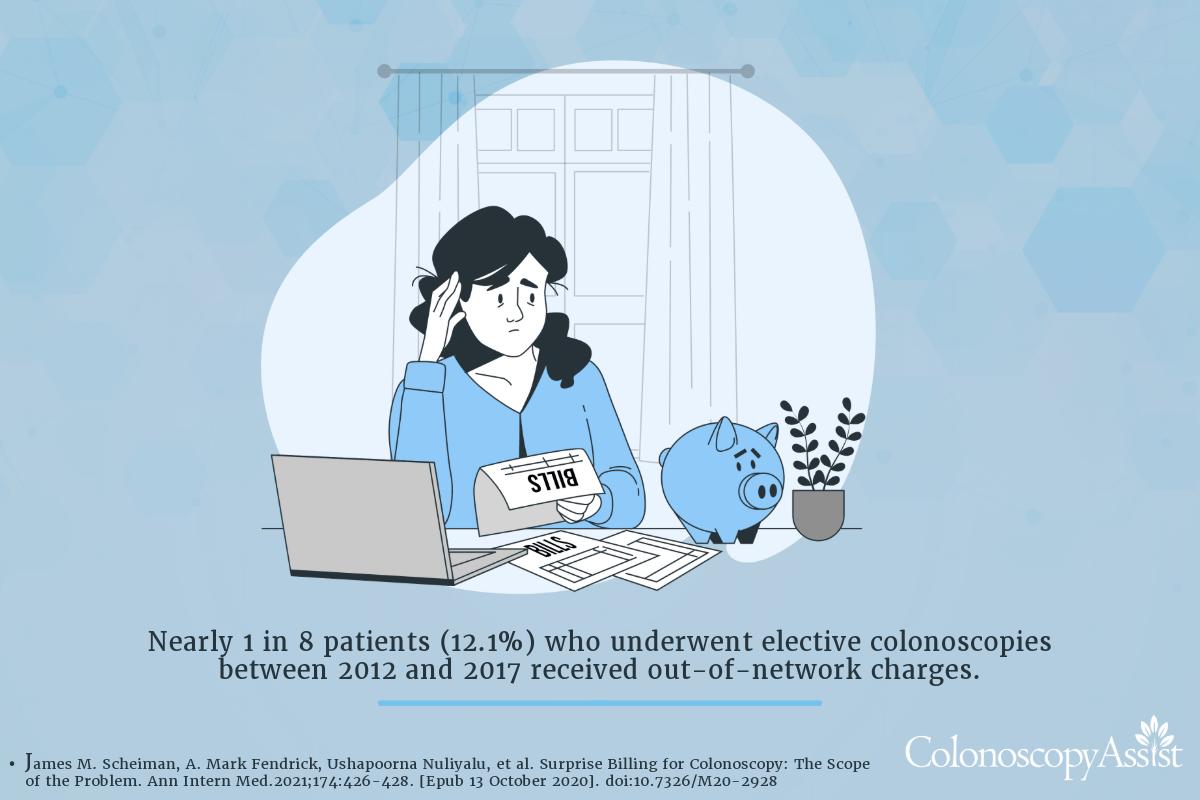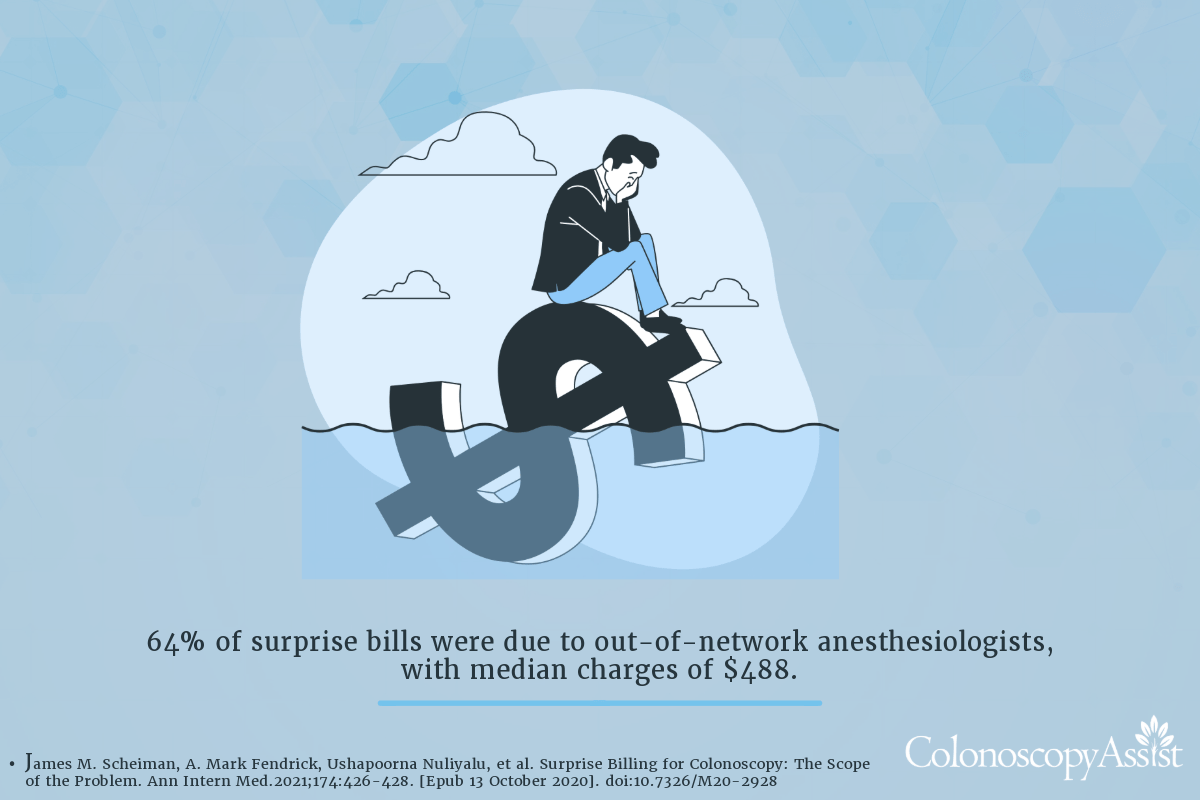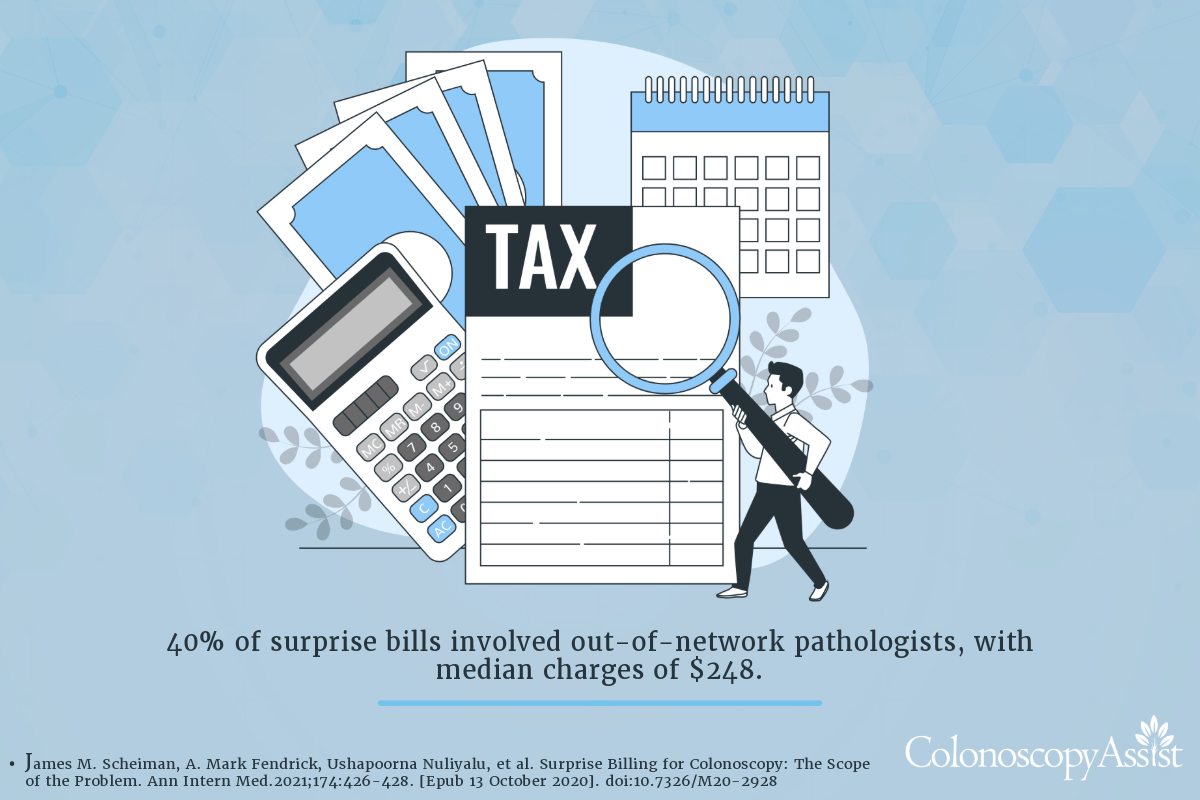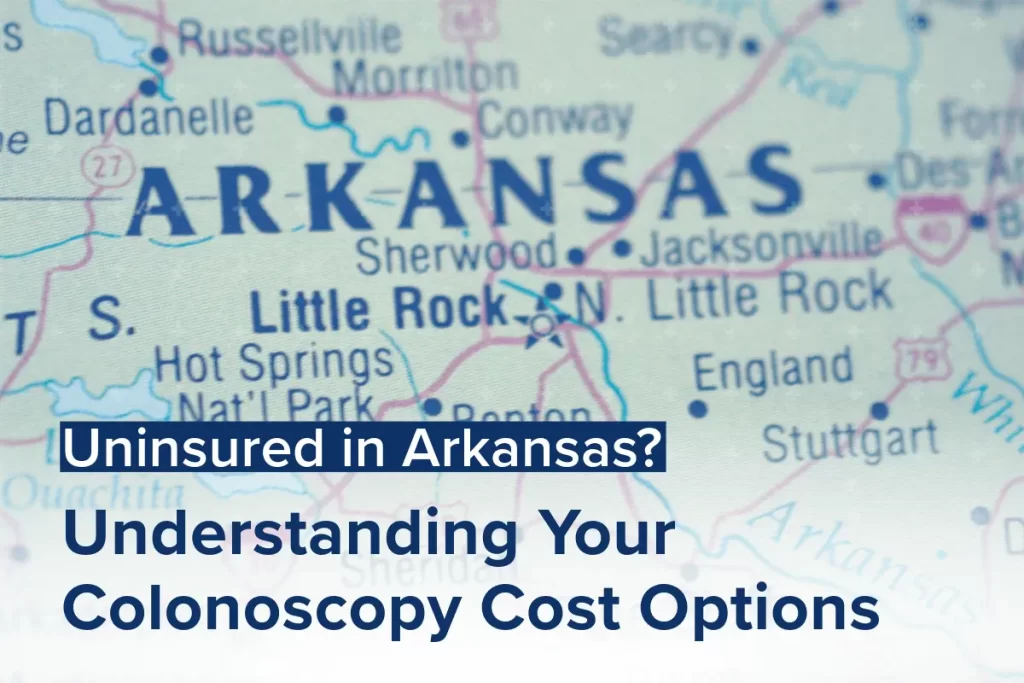Table of Contents
ToggleSchedule Your Procedure Today
- All-Inclusive Service
- Board-Certified Physicians
- Transparent Pricing
Figuring out colonoscopy insurance coverage can be more complicated than expected. Many health plans promote fully covered screenings, but patients often find themselves facing unexpected bills after the procedure.
A study led by Dr. James M. Scheiman at the University of Virginia Health System found that nearly 1 in 8 patients (12.1%) who underwent elective colonoscopies between 2012 and 2017 received out-of-network charges, with an average surprise bill of $418.
The insurance process for colonoscopies is not always straightforward. Patients often ask:
- Is my colonoscopy preventive or diagnostic?
- Are there exceptions to insurance coverage that could leave me with unexpected costs?
- If my claim is denied, what are my options?
In today’s blog post will break down the complexities of colonoscopy insurance coverage, provide insight on how to avoid unexpected charges, and explore why self-pay options like ColonoscopyAssist provide a simpler, more predictable alternative.
Insurance Coverage for Colonoscopies: What Patients Need to Know

Colonoscopy coverage varies widely depending on insurance classification, out-of-network providers, and additional medical services like anesthesia and pathology.
The difference between a preventive and diagnostic colonoscopy is often the deciding factor in whether insurance covers the procedure in full.
Preventive vs. Diagnostic Colonoscopy Screening: What Determines Coverage?
| Type of Colonoscopy | What It Means | Typical Insurance Coverage |
|---|---|---|
| Preventive | Routine screening for patients 45+ with no symptoms | Fully covered under the Affordable Care Act (ACA) for in-network providers |
| Diagnostic | Ordered due to symptoms, family history, or after an abnormal test | Co-pays, deductibles, and out-of-pocket costs apply |
How to Determine If Your Colonoscopy Screening Is Preventive or Diagnostic
- Check the reason your doctor is recommending the procedure. If you have a history of polyps, abnormal stool tests, or symptoms, your colonoscopy may be classified as diagnostic rather than preventive.
- Ask your insurer for pre-approval. Confirm whether the procedure will be fully covered as preventive care or if out-of-pocket costs apply.
- Find out what happens if polyps are removed. Some insurance companies reclassify a preventive colonoscopy as diagnostic if polyps are found and removed, shifting costs to the patient.
Exceptions and Potential Pitfalls in Insurance Coverage

Insurance policies often contain fine print that can lead to unexpected costs, even when a colonoscopy is classified as preventive.
1. Anesthesia and Sedation Charges
The involvement of out-of-network anesthesiologists can result in significant surprise bills. Dr. Scheiman’s research indicates that 64% of surprise bills were due to out-of-network anesthesiologists, with median charges of $488.
Recommendation: Before scheduling, confirm whether anesthesia is fully covered or if separate charges apply.
2. Pathology and Biopsy Fees
Sending removed polyps or tissue samples to out-of-network pathologists can incur additional costs. The same study found that 40% of surprise bills involved out-of-network pathologists, with median charges of $248.
Recommendation: Ask your provider if pathology is included in your coverage, or if it will be billed separately.
3. Out-of-Network Providers
Even if the primary facility is in-network, associated services might not be. This discrepancy can lead to unexpected expenses.
Recommendation: Verify that all providers involved in your procedure, not just the gastroenterologist, are covered under your plan.
What to Do If Your Insurance Denies Coverage

Insurance denials aren’t uncommon, but they can often be appealed.
How to Appeal a Denied Colonoscopy Claim
- Request a written explanation from your insurance provider detailing why the procedure was denied.
- Ask your doctor to submit supporting documentation showing why the colonoscopy was medically necessary.
- File an official appeal with your insurance company, including a letter from your physician.
- Check state regulations, some states have laws requiring insurers to cover screenings that were previously denied.
ColonoscopyAssist: A Simpler, More Affordable Option
For those frustrated with insurance loopholes, denials, and hidden costs, we provide a clear, upfront alternative.
| Insurance-Based Colonoscopy | ColonoscopyAssist Self-Pay Option |
|---|---|
| Surprise bills—deductibles, co-pays, and extra fees may apply | Flat-rate pricing with no hidden costs |
| Pathology and anesthesia may not be covered | One all-inclusive price covers everything |
| Out-of-network charges can increase patient costs | Nationwide network of accredited providers |
| Complex pre-approvals and appeals process | Simple booking with guaranteed pricing |
Final Thoughts
The insurance process for colonoscopies is often confusing, leading to unexpected expenses that patients didn’t anticipate.
✔ Understanding whether your colonoscopy is preventive or diagnostic is key to knowing what you’ll pay.
✔ Even with insurance, hidden costs from anesthesia, pathology, and out-of-network providers can drive up expenses.
✔ If your insurance denies coverage, an appeal may be an option, but it requires time and documentation.
If cost concerns or insurance confusion have kept you from scheduling a colonoscopy, there’s a better way. ColonoscopyAssist makes it easy, affordable, and transparent.
Ready to skip the insurance hassle and book your colonoscopy? Explore ColonoscopyAssist’s affordable, no-surprise pricing today.
EXCELLENT rating
Based on 2125 reviewsTrustindex verifies that the original source of the review is Google. I was referred to ColonoscopyAssist through my healthcare sharing ministry. They communicated with me every step of the way and were a lower-cost solution to getting a colonoscopy since my preventative screenings aren't covered. I got mine done through a very reputable endoscopy group and they were wonderful.Trustindex verifies that the original source of the review is Google. The entire process was seamless and the staff was friendly and professional. Overall. I had a wonderful experience at your facility.Trustindex verifies that the original source of the review is Google. After the initial, sign up with ColonscopyAssist, it took about 2-3 weeks to get a call from doctors office and appt was 2 weeks later. Everything went smoothly, the doctor was not personable but was professional. Glad it is done. Now my husband has peace of mind.Trustindex verifies that the original source of the review is Google. Simple and easy with great savings.Trustindex verifies that the original source of the review is Google. ColonoscopyAssist was very helpful, responsive, and made the process happen smoothly, not to mention made the procedure much more affordable.Trustindex verifies that the original source of the review is Google. This was as easy as it could have been! Competent and Professional are words that come to mind. This is a great program. From beginning to end it proceeded without a glitch!Trustindex verifies that the original source of the review is Google. Everything worked well before, during and after procedure. Got lots of information. Only ask to upgrade the guide when people are taking tables and not a liquid prep.Trustindex verifies that the original source of the review is Google. very professional and friendly service, everything was organized and I was advised on all the steps. they made this process simple.


















